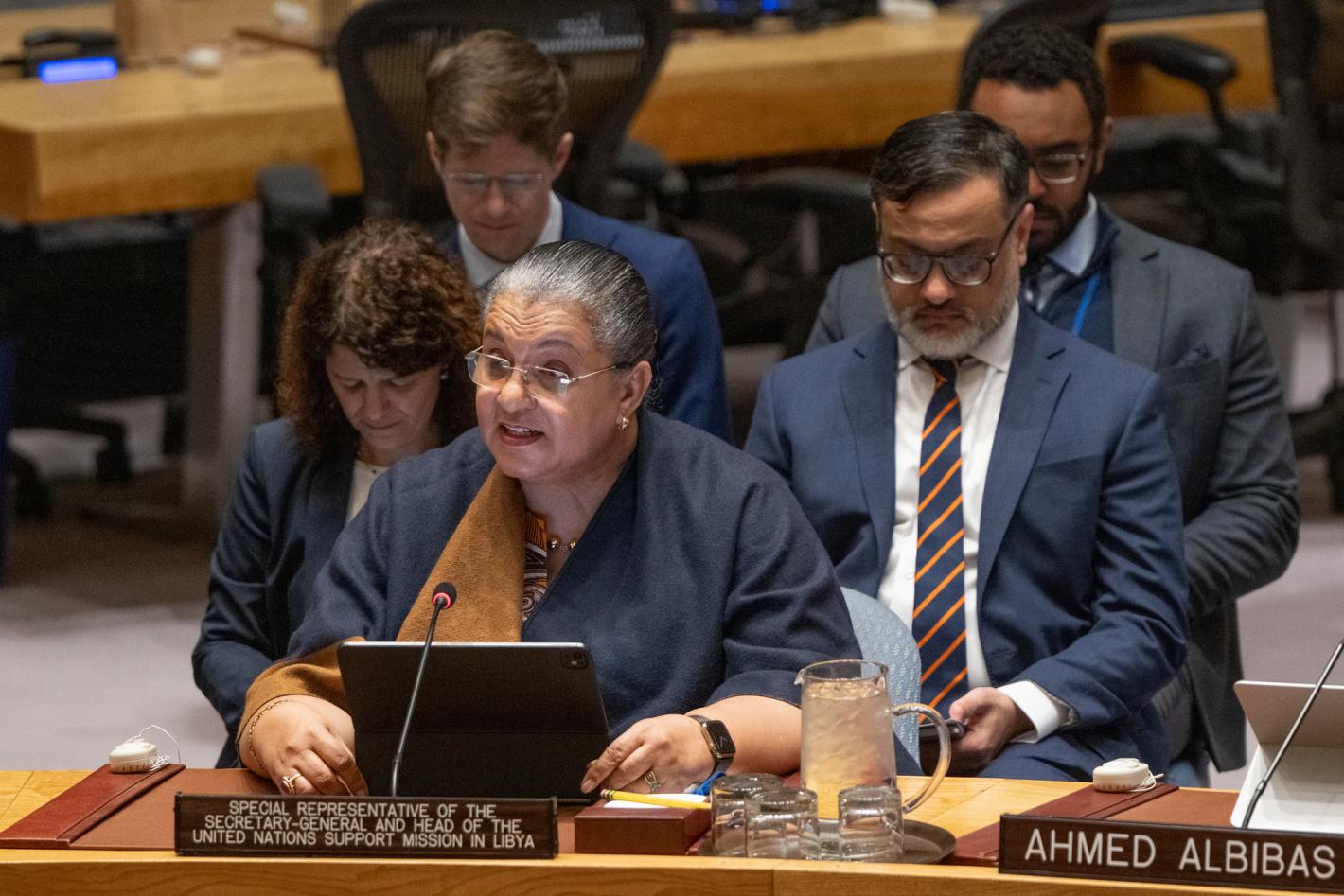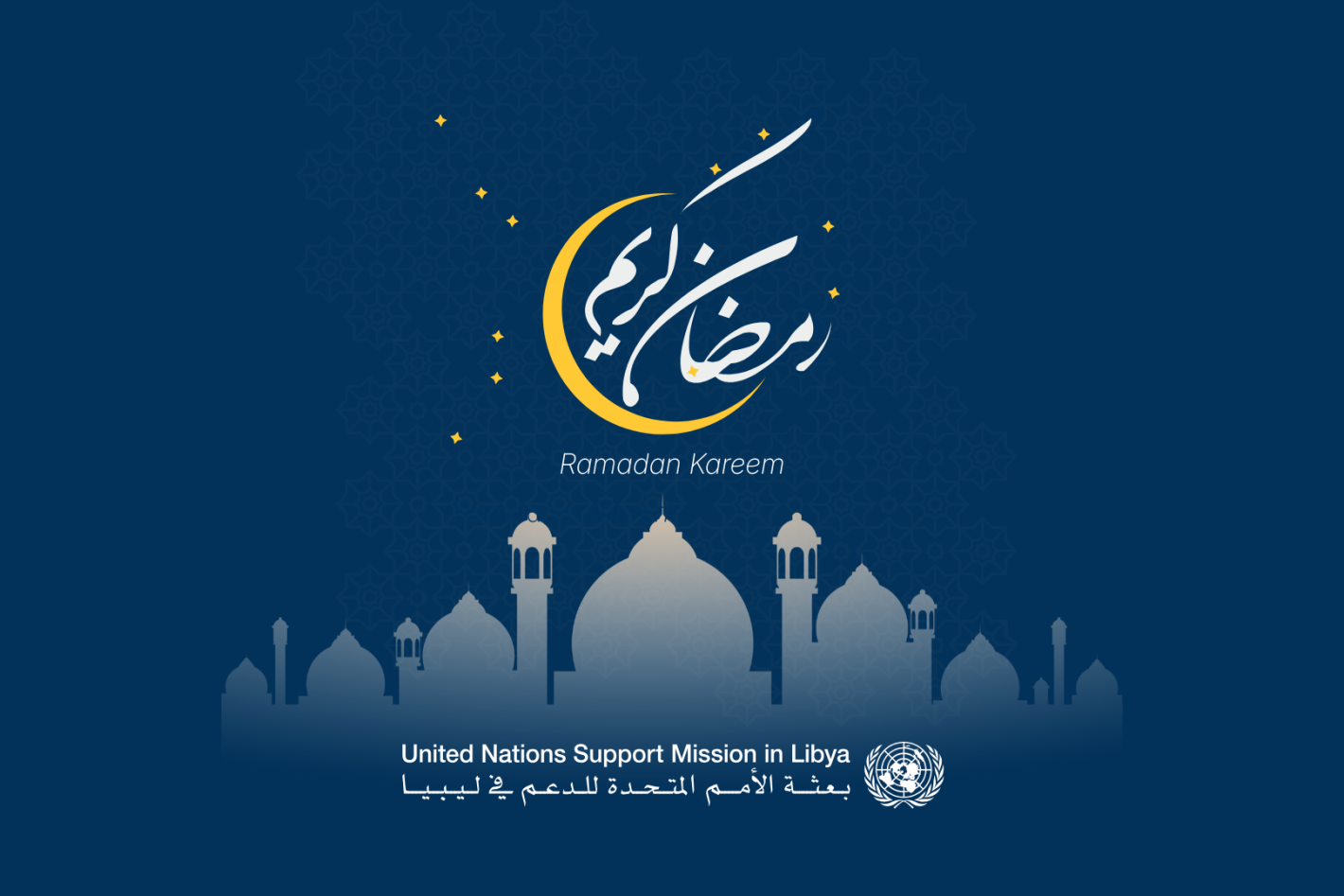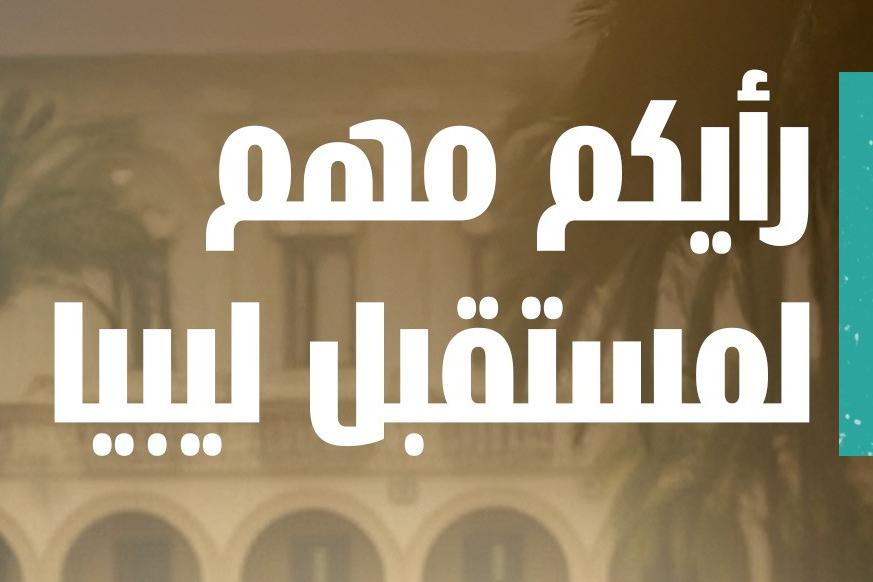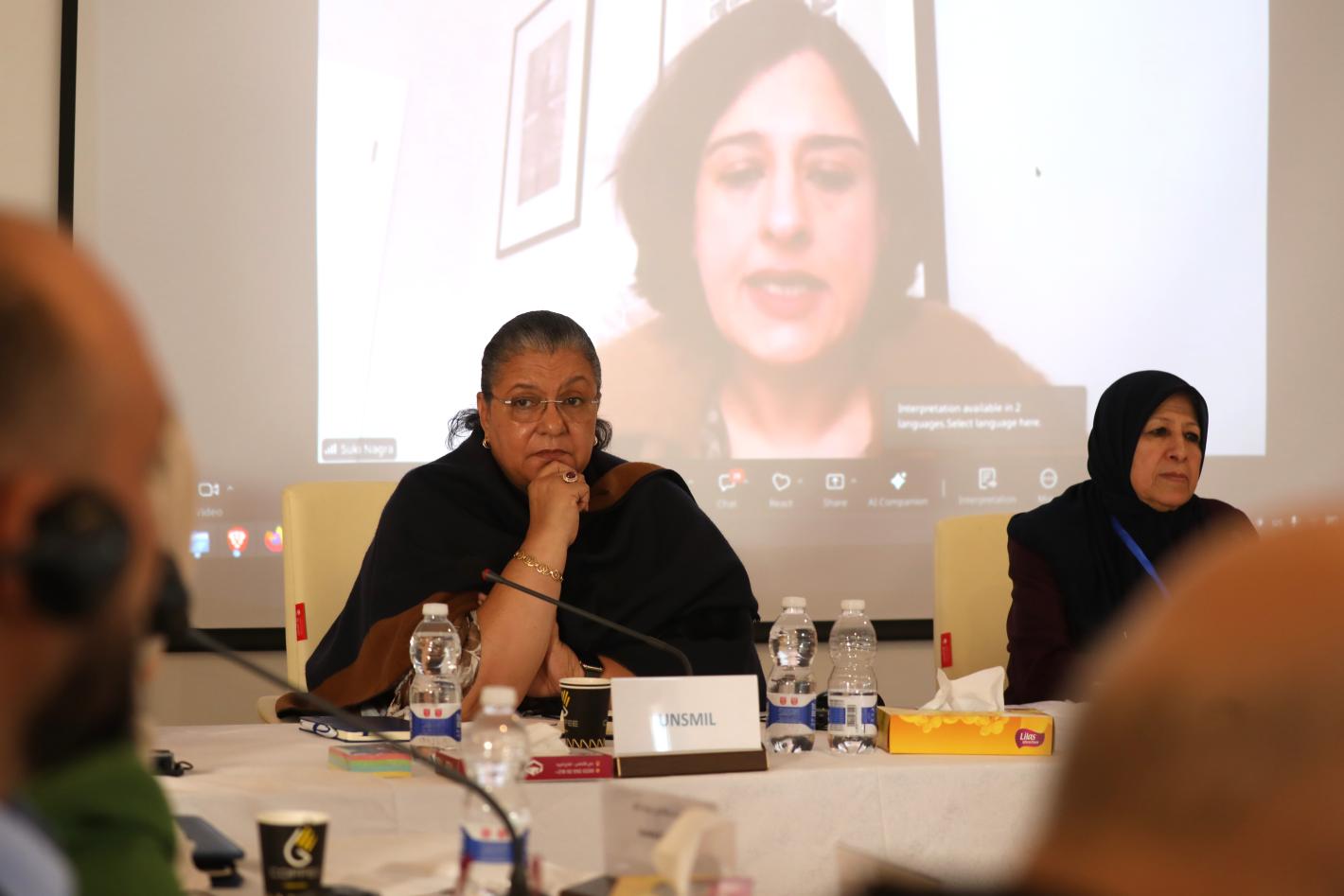السيد الرئيس،
أشكركم على إتاحة الفرصة لإحاطة مجلس الأمن بالتطورات الهامة في ليبيا خلال الشهر الماضي.
منذ آخر اجتماع لمجلس الأمن حول ليبيا في 25 تموز/ يوليو الماضي، واصلت الأمم المتحدة العمل مع الأطراف الليبية الفاعلة - وعلى جميع المستويات – لتسهيل التوصل إلى حل للإنسداد السياسي.
يعتريني قلق بالغ من أن حالة الجمود الحالية والتأخيرات المستمرة في تنفيذ العملية الانتخابية تشكل تهديداً متزايداً للأمن في طرابلس وما حولها، وربما لجميع الليبيين.
وقد تجسد هذا التهديد قبل أيام قليلة عندما أصبحت طرابلس مرة أخرى مسرحاً لاشتباكات عنيفة بين المجموعات المسلحة الداعمة للسيد دبيبة وتلك الداعمة للسيد باشاغا.
فقد اندلع القتال في الساعات الأولى من يوم 27 آب/ أغسطس، واشتد بسرعة ليطال المناطق المأهولة بالسكان المدنيين في طرابلس. واشتمل على استخدام عشوائي للأسلحة المتوسطة والثقيلة، مما أضرّ بالمدنيين والبنية التحتية المدنية.
وبحسب السلطات الليبية، راح ضحية هذه الاشتباكات ما لا يقل عن 42 شخصاً، بينهم أربعة مدنيين، فيما أصيب 159 شخصاً. وأفيد بنزوح خمسين أسرة فيما ولحقت أضرار جسيمة بخمسة مرافق صحية. وتضرر مركزان لاحتجاز المهاجرين واللاجئين يضمان ما مجموعه 560 شخصاً.
ويبدو أن هذه محاولة من القوات الموالية لباشاغا لدخول العاصمة من الشرق. غير أنهم منعوا من ذلك على يد القوات الموالية للدبيبة في زليتن – الواقعة على بُعد حوالي 160 كيلومتراً شرقي طرابلس، وأجبروا على التراجع عقب الاشتباكات. وبالمثل، تم صد محاولات المجموعات المسلحة الأخرى الموالية لباشاغا من التقدم نحو العاصمة من الغرب والجنوب الغربي.
وانحسر القتال في طرابلس وضواحيها في 28 آب/ أغسطس، رغم أن الوضع ظل متوتراً ومتقلباً.
وقد ساد هدوء هش في طرابلس منذ ذلك الحين. ومن غير الواضح كم من الوقت سيستمر هذا الهدوء.
وقد تؤدي الهجمات الانتقامية من كلا الجانبين والنية المعلنة من قبل حكومة الوحدة الوطنية لاعتقال العناصر الموالية لباشاغا والمتورطة في القتال إلى اشتباكات مسلحة يمكن أن يتضرر منها مرة أخرى السكان المدنيون.
السيد الرئيس،
أشعر بقلق بالغ من محدودية التقدم السياسي المحرز خلال الفترة المشمولة بالتقرير. لقد أكدت الأمم المتحدة باستمرار أن إجراء الانتخابات ما يزال السبيل الوحيد للخروج من المأزق الحالي. وعلى الرغم من جهودنا المستمرة، إلا إنه لم يكن هناك أي تقدم في صياغة توافق في الآراء حول إطار دستوري للانتخابات.
وأجرى رئيس مجلس النواب، عقيلة صالح، ورئيس المجلس الأعلى للدولة، خالد المشري، عقب اجتماعهما في جنيف في حزيران/ يونيو مزيداً من المناقشات في تركيا في 1 آب/ أغسطس وفي مصر في 14 آب/ أغسطس. بيد إنه، وللأسف، استمرت الخلافات لا سيما بشأن شروط الترشح بالنسبة لمرشحي الرئاسة.
وهنا أحث رئيسي المجلسين على استكمال العمل الذي أنجزته اللجنة الدستورية المشتركة. فمن الأهمية بمكان أن يتم التوصل إلى اتفاق بشأن إطار دستوري وجدول زمني للانتخابات التي ستمكن الشعب الليبي من اختيار قادته.
السيد الرئيس،
حدثت بعض التطورات الإيجابية خلال الفترة المشمولة بالتقرير. وأثني على وجه الخصوص على الجهود المستمرة التي تبذلها اللجنة العسكرية المشتركة (5+5) للحفاظ على تنفيذ اتفاق وقف إطلاق النار وتعزيزه.
وتجدر الإشارة إلى أنه في 27 آب/ أغسطس، اتصل أعضاء اللجنة العسكرية المشتركة من الشرق بنظرائهم في الغرب لطمأنتهم بأن الجيش الوطني الليبي لن يشارك في الاقتتال.
وفي وقت سابق، في 9 آب/ أغسطس، اجتمعت اللجنة العسكرية المشتركة مع بعثة الأمم المتحدة للدعم في ليبيا في سرت لتعزيز جاهزية الآلية الليبية لمراقبة وقف إطلاق النار.
وقد أحرزوا تقدماً في تفعيل غرفة العمليات المشتركة في سرت. كما أنهوا العمل حول طرائق انسحاب القوات الأجنبية والمقاتلين الأجانب والمرتزقة من ليبيا.
وفي تطور إيجابي آخر، صوتت الجمعية العامة للمحكمة العليا في ليبيا في 18 آب/ أغسطس على إحياء الدائرة الدستورية للمحكمة، والتي تم تعليق أعمالها منذ عام 2016.
إن إعادة تفعيل هذه الدائرة يمكن أن يسهم في حل الخلافات حول شرعية القرارات التي تتخذها المؤسسات الليبية.
كما شجعني التقدم المحرز في المصالحة الوطنية، بما في ذلك جهود المجلس الرئاسي لتنفيذ "الرؤية الاستراتيجية للمصالحة الوطنية".
أؤكد مجدداً استعداد الأمم المتحدة لدعم الجهود الليبية لتحقيق المصالحة الوطنية وكذلك لمؤتمر الاتحاد الأفريقي المزمع عقده بشأن المصالحة الوطنية في ليبيا في أقرب فرصة ممكنة.
السيد الرئيس،
بالانتقال إلى التطورات الاقتصادية، استؤنف إنتاج النفط في 17 تموز/ يوليو. وبحلول نهاية تموز/ يوليو، وصل الإنتاج إلى مستويات ما قبل الإغلاق عند 1,2 مليون برميل يومياً. ومؤخراً، أعلنت المؤسسة الوطنية للنفط في ليبيا عن خطط لزيادة الطاقة الإنتاجية للنفط.
ومع ذلك، يعتريني قلق من أن السخط العام المتزايد في المنطقة الجنوبية بسبب نقص الخدمات الأساسية وسوء الأحوال المعيشية قد يؤدي إلى إغلاق حقول النفط مرة أخرى في المنطقة.
فقد أدى انفجار صهريج وقود في محيط الزاوية في 1 آب/ أغسطس، والذي راح ضحيته 25 شخصاً بالإضافة إلى إصابة العشرات، إلى اندلاع موجة من الاحتجاجات بسبب تهميش المجتمعات المحلية في الجنوب منذ فترة طويلة.
وفي 21 آب/ أغسطس، هدد عدد من الأعيان المحليين بتشكيل حكومة موازية في الجنوب إذا لم تتم تلبية مطالبهم باحترام حقوقهم في الخدمات الأساسية ومنحهم تمثيلاً أقوى في مؤسسات الدولة.
الثروات الطبيعية الليبية هي ملك لجميع الليبيين، ويجب توزيع العائدات من صادرات النفط بشكل عادل ومنصف.
السيد الرئيس،
يؤسفني أن أفيد بأن انتهاكات حقوق الإنسان في ليبيا ما تزال مصدر قلق كبير. ففي 20 آب/ أغسطس، طوقت مجموعات مسلحة تابعة للجيش الوطني الليبي بلدة قصر بوهادي، الواقعة على بعد 25 كلم جنوب سرت.
وحُرم المدنيون من حريتهم في التنقل ومُنعوا من مغادرة مناطقهم وأُجبرت المستشفيات والمتاجر والمدارس ومحطات الوقود وغيرها من المرافق الأساسية على الإغلاق. وفي 26 آب/ أغسطس، انسحبت الأطراف العسكرية من المدينة، لكنها واصلت السيطرة على جميع التنقلات داخل المدينة وخارجها.
إنني أحث الأطراف الفاعلة ذات الصلة على الرفع الفوري للقيود المستمرة المفروضة على سكان قصر بوهادي، وأحذّر من أن الوضع يمكن أن يتصاعد أكثر ليصل إلى نزاع بين المجتمعات المحلية.
واستمر تعرض الأفراد الذين يمارسون حقهم في حرية التعبير بشكل سلمي للاختطاف والاختفاء القسري والاحتجاز التعسفي.
ويتواصل العنف ضد الناشطات واعتقالهن واحتجازهن بشكل غير قانوني. ومما يسبب قلقاً بالغاً حملات التشهير التي تستهدف الجهات الفاعلة في المجتمع المدني، ولا سيما النساء، والتي تحتوي على خطاب الكراهية والتحريض على العنف، ويجب أن تتوقف.
وما يزال المهاجرون واللاجئون أيضاً يعانون من انتهاكات خطيرة لحقوق الإنسان. فوفقاً لآخر الأرقام، تم احتجاز 2,661 مهاجراً ولاجئاً بشكل تعسفي في مراكز احتجاز رسمية مع تقييد وصول المساعدات الإنسانية.
وتواصل الأمم المتحدة دعوتها للإفراج الفوري عن جميع المحتجزين تعسفياً وإتاحة الإجراءات القانونية الواجبة للمتهمين بمخالفة القوانين الليبية.
السيد الرئيس،
من الأهمية بمكان أن تحافظ جميع الأطراف الليبية الفاعلة على الهدوء على الأرض، وأن تمتنع عن التصعيد في الخطابات والأفعال، وأن تتخذ خطوات فورية لإنهاء الاستقطاب السياسي الذي يتسبب في أعمال عنف.
وفي ضوء تدهور المناخ السياسي والأمني في طرابلس، يجب على الأمم المتحدة أن تستمر في تقديم وتعزيز المساعي الحميدة والوساطة لمساعدة الجهات الليبية على إيجاد حل للإنسداد الحالي والسعي نحو مسار توافقي لإجراء الانتخابات.
الليبيون أنفسهم مسؤولون عن تقرير مصيرهم. وأي دعم تتلقاه الأطراف من داخل ليبيا أو خارجها يجب أن يكون لتوحيدهم لا لتفرقتهم.
وقد طرح الأمين العام عدداً من المقترحات لقيادة البعثة ومساعيه الحميدة. وأحث الجميع على دعم جهود الأمين العام لمساعدة الليبيين على رسم طريقهم نحو السلام.
شكراً لكم، سيادة الرئيس






